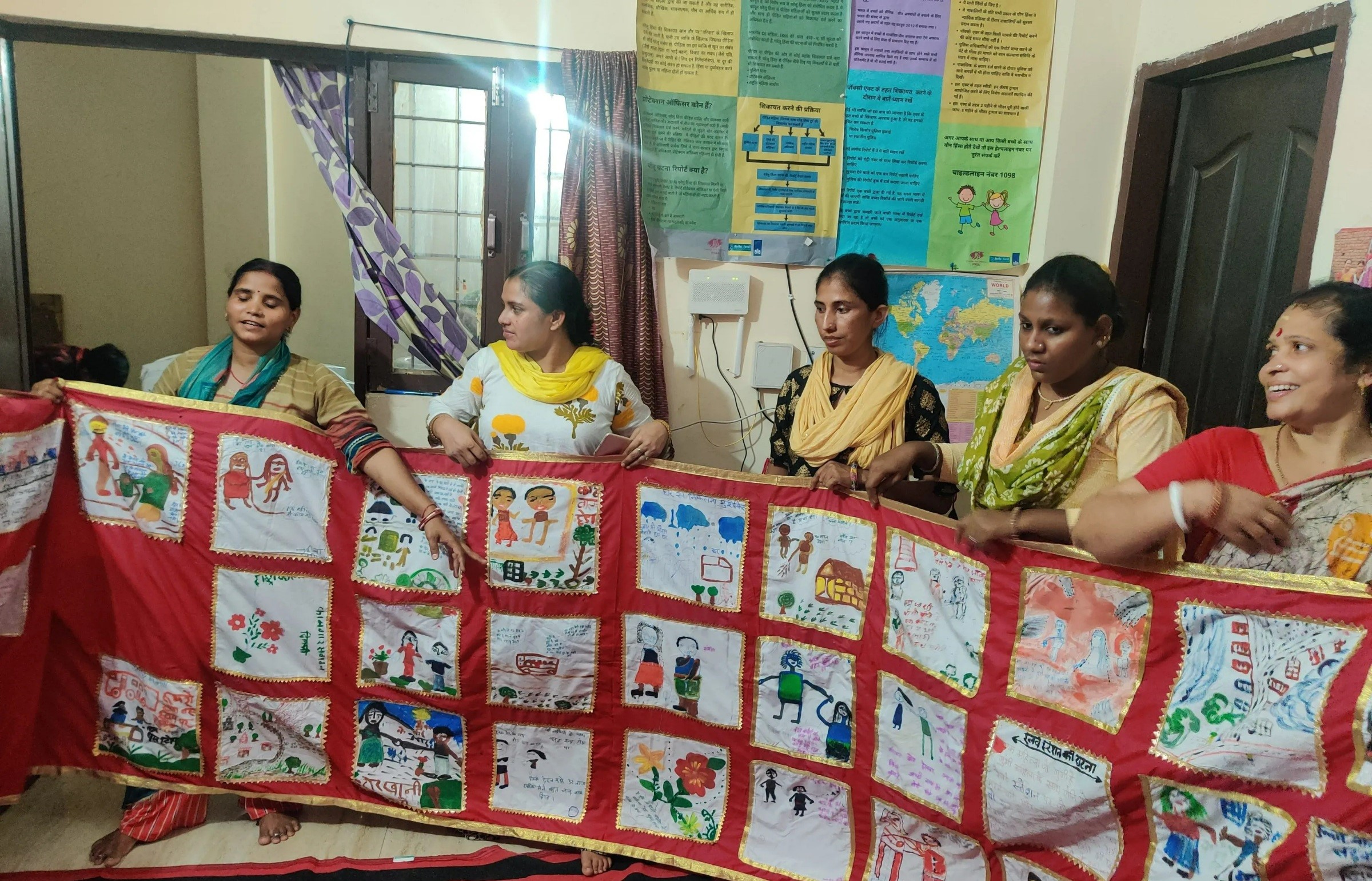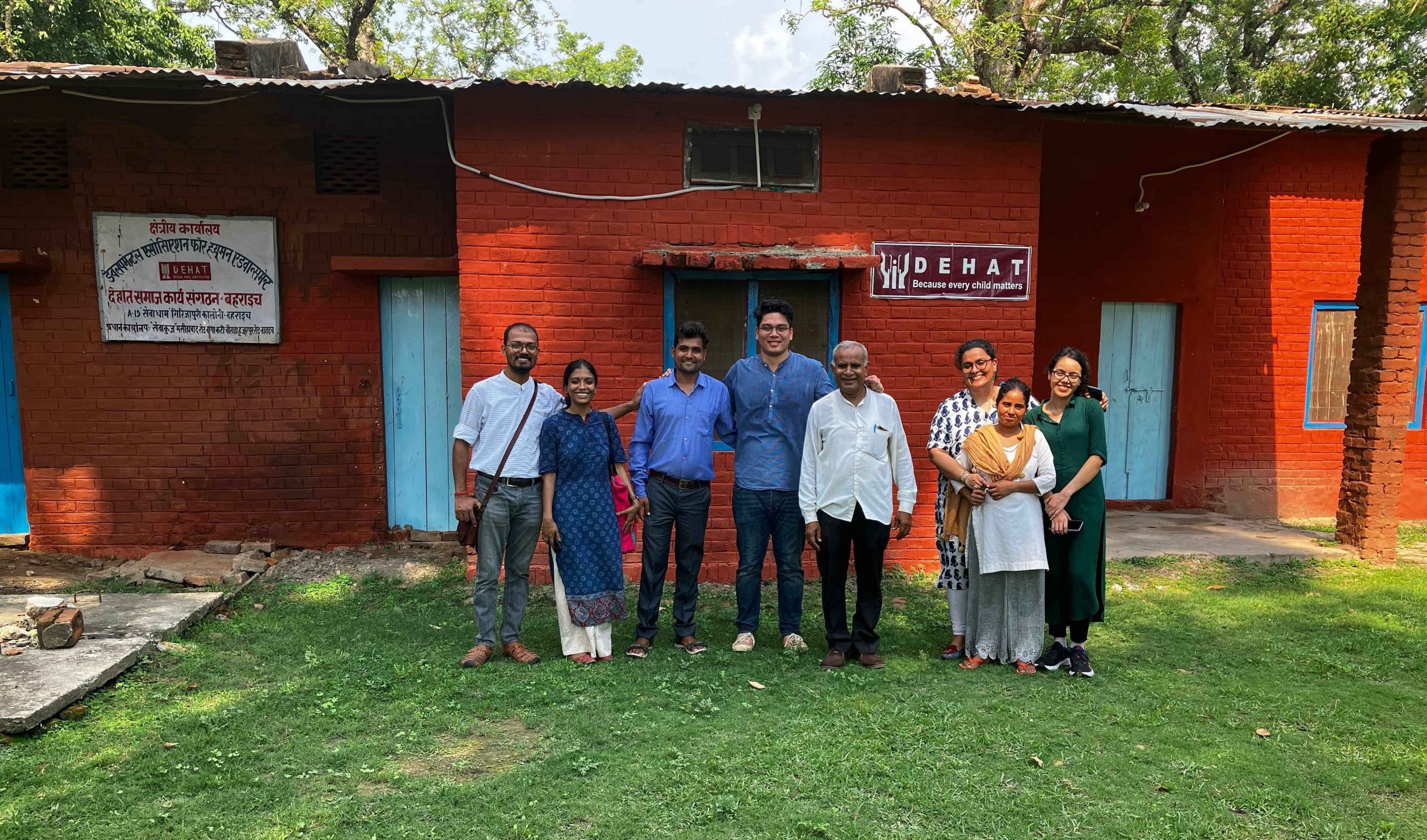Arriving at MASS HQ, Ghataprabha Village
Over 70 kilometres from Belgaum’s city centre is the office from which MASS operates; as of today, MASS is in its 25th year, is 3000+ members strong, and is managed by a diverse group of exemplary women – all ex-Devadasi women in Belgaum who’ve rallied for the past two decades to put an end to the Devadasi custom in their district – and they’ve succeeded!
As they welcomed us into their office, we realised that nine out of the ten women there spoke only Kannada, which meant that Saberaji, Head of Finance and Accounts at MASS (and the only one there who spoke Hindi + Kannada), would be relaying questions and answers between us for the rest of the day. The language barrier soon dissolved, and each of the women present shared their stories, challenges, and needs generously.
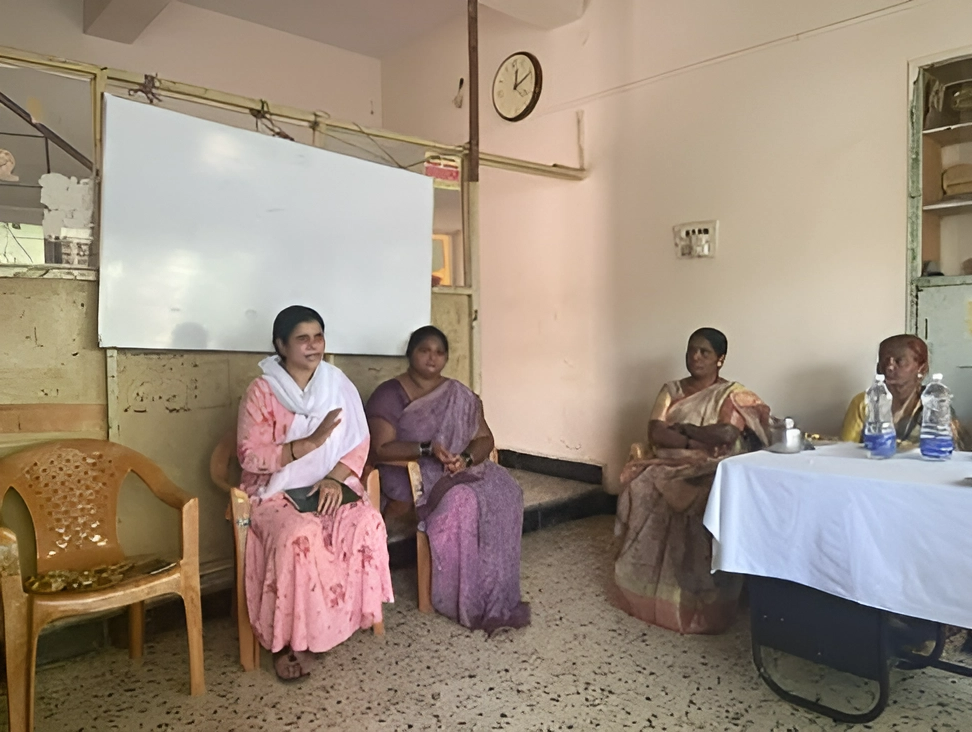
(L-R) Saberaji, Srideviji, Sitavvaji, Sunandaji at MASS’s Ghataprabha office
Hearing MASS’s Origin Story
Devadasi, meaning a “servant of god”, is an old custom of dedicating young girls (mainly from the Dalit community) to the Goddess Yellamma – a local Hindu deity in the states of Maharashtra and Karnataka. What had typically followed for the women of MASS once they were dedicated as Devadasis years ago was a cycle of poverty, hard labour, social exclusion, and sex trafficking.
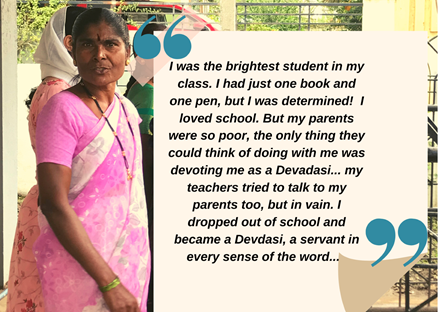
The roots of MASS can be traced to a large-scale survey by The Karnataka State Women’s Development Corporation (KSWDC) and the organization MYRADA in 1991, an exercise which not only captured the incidence, causes of, and issues created by the Devadasi custom (which despite being outlawed was still prevalent) but also gave strength to young Devadasi women to break away from its shackles.
One of those young women was Smt. Sitavvaji, who started the movement that culminated in the formation of MASS in 1997. What was most striking, as she spoke to us 25 years later, was that she and her sisters at MASS had experienced the darkest of life’s circumstances and yet embraced and enabled change so readily over their lifetimes. Since then, Sitaavaji has been awarded the Padmashree and won several other accolades, but her greatest reward is the fact that generations that have followed hers haven’t fallen prey to the Devadasi custom. Her optimism and drive to keep working till this custom is ended, wherever it exists, is infectious and inspiring!
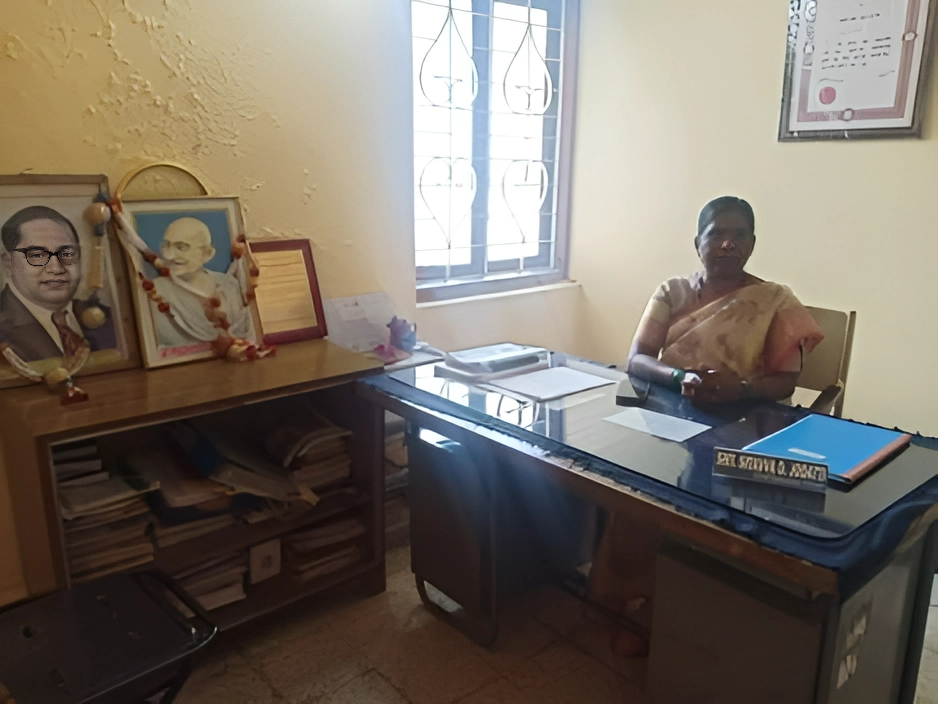
Sitavvaji in her office
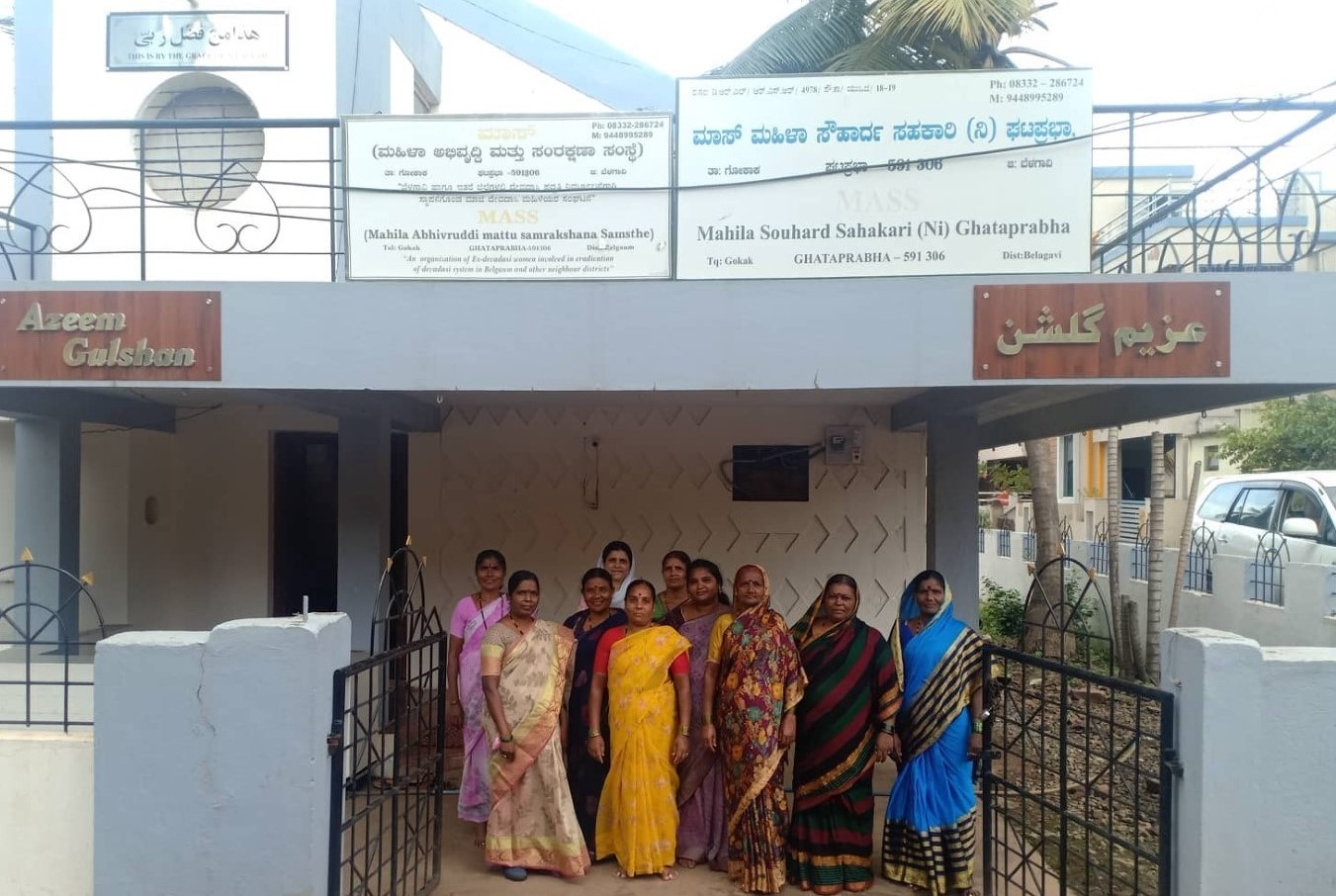
Articulating our emotions
“During the community interactions, one thing that really stood out and impressed me was that though the majority of the women/children were shy to interact, there were a few that made their asks very clear. With the children, it was requests for books, stationery, computer classes, and the underlying message of better opportunities. Similarly, the women asked for better sources of livelihoods, and better prospects for their children – access to scholarships, higher degrees and employment, and a realistic pension that could support them. This to me was amazing, their asks were not apologetic but a mere basic expectation that should be available to them. Although there are miles to go before we can talk about equity, what was impressive is the massive leap in dignity. The caste barriers although not shattered, were definitely cracked and gave room for air to pass through and life to breathe. Resilience for these women was not something they think about, since the adversities they faced as a Devadasi, transcends every other challenge they face.” –– Saleha
“Through the day, as various members of the organization- the founder, the Directors, the SHG group members, children of ex-devadasis and other Dalit families, recounted their lived experiences and vulnerabilities linked with those, we couldn’t help ourselves from asking them why MASS, alone, had been successful in ending this practice in the district given KSWDC’s years of support and focus, through multiple partners, on this issue across districts in Karnataka. What we heard was a simple notion that the degree of success of such efforts, especially those fighting historically suppressing social structures, is directly linked with the degree of participation, leadership, ownership and implementation of and by different generations of the negatively impacted communities- all of which MASS has embraced beautifully in all its work. Organizations in other districts have failed to sow the seeds of a community movement to end this practice and hence, have been left behind.” –– Ustati
“To me, the most striking aspect of the exploitative Devadasi custom was how deeply connected it was to geography, climate and natural resources. Every origin story narrated during our visit began with a mention of floods, droughts, sickness and poverty, and how the women’s parents had been confident that if they devoted their daughter to Goddess Yellamma, they would be spared the harshest impacts of those calamities. The women recalled how, even as child labourers on private farms, they were paid just half a paisa per day (on the days they showed up). If, however, they weren’t able to make it to work, or the harvest had been poor – they wouldn’t be compensated. Income lost that way set them back significantly. This connection really helped contextualize 1) how marginalized rural communities over the decades have fallen deeper into poverty (because land and produce are controlled by upper class/caste communities), 2) what it means when we say “climate change will hit the most marginalized of us the hardest” and 3) how communities pushed to the brink cope with the resulting crises (by turning to extreme spirituality). This takeaway helps one think of how, moving forward, such circumstances need to inform talks about climate change – which for India will have a huge bearing on natural resource loss, distribution, access, and poverty.” –– Kasturi
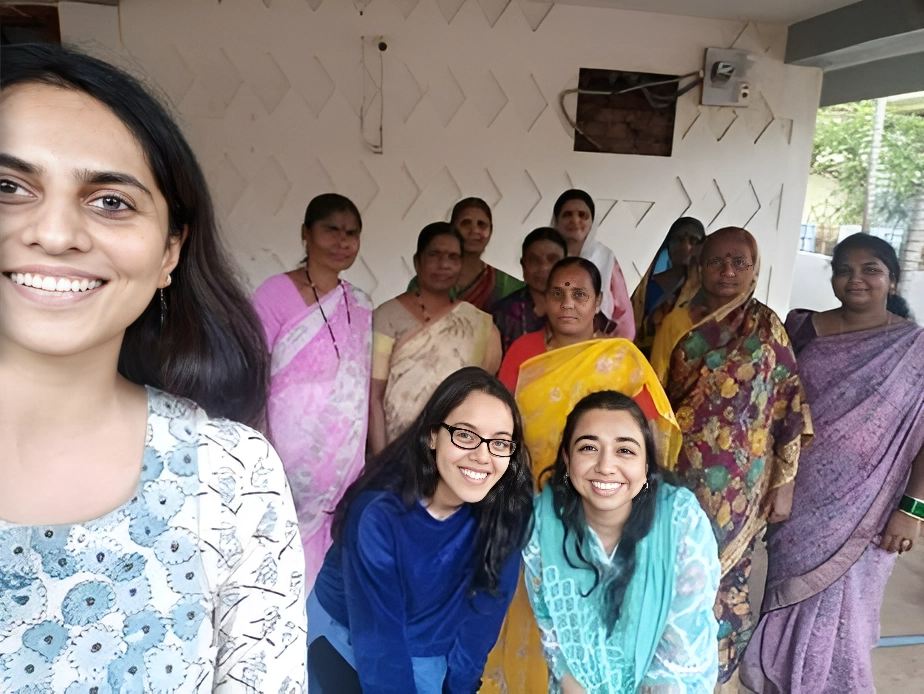
Witnessing ‘Participation’ in its true essence
MASS’s programs, much like its structure, are inherently participatory; thanks to that, each program we visited throughout the day brought us face-to-face with each of MASS’s stakeholder groups – ex-Devadasi women, their children, and economically disadvantaged Dalit families.
MASS Health Camp, Hukkeri Taluka
At the Taluka’s public hospital, MASS facilitates free routine health camps for ex-Devadasi women, their families, and economically weak Dalit families from villages across the district. This health camp brings together village doctors and health specialists, who’ve been sensitized to issues visiting patients face, and serve hundreds of people through the day. Patients can get tests done at this camp for HIV-AIDS, Diabetes, Blood Pressure and Eyesight.
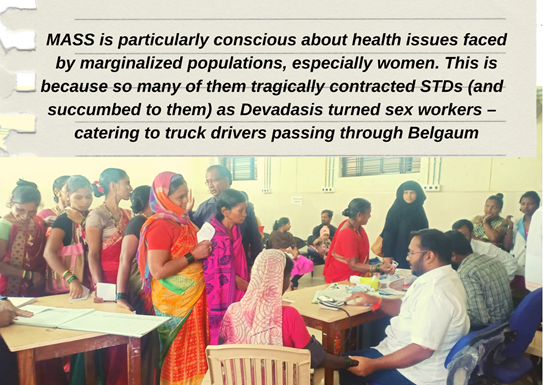
Community Centre, Raxi Village
The Raxi Youth Centre is one of 7 community centres operated by MASS in collaboration with the State Government. These centres serve as a safe space for village youth and elders alike. Here, MASS has set up daily tuition classes for primary and secondary level school children, as well as high school children with specialisations. The centre also hosts training for elders in the village – these trainings are livelihood interventions by MASS for women who have no means to earn a living. By providing them with training and technical aid in stitching, MASS has ensured that the community centres become means of relief, succor, and progress for the community. The residents enjoy the space so much that they also use it as a venue for weddings and other celebrations.
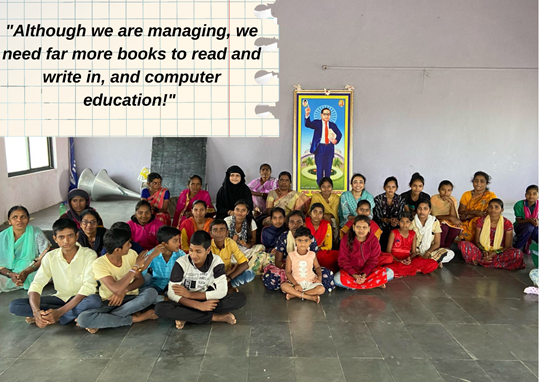
Legal Aid Centre, Raibag Village
Having been left out of official systems for so long, the women of MASS understood the need to have institutions that could be approached for counselling and dispute resolution, especially by those who could not afford all the costs that would come with a court case. The centre we visited was situated at the heart of a residential block in Raibag village. The centre is run by a lawyer who is commissioned by MASS to deliver resolutions, and an ex-Devadasi woman and MASS beneficiary who assists him.
Self Help Group + Child Activity Centre, Bekkeri Village
One of MASS’s core models is the Self-Help Group (SHG) model – which runs on women’s membership and a membership fee, which in turn opens up easy access to financial and moral support. For the past twenty years, MASS has operated one such SHG at Bekkeri village for women who are ex-Devadasis and also resident women from poor families.
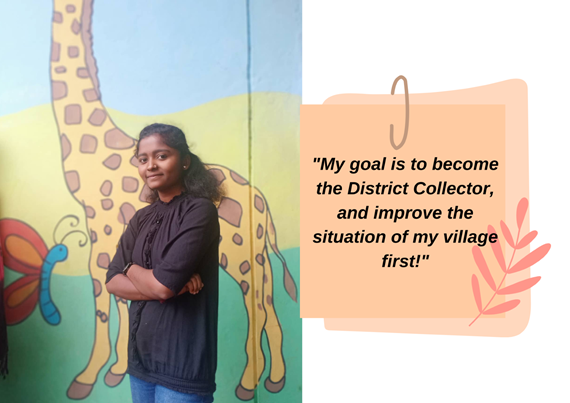
Translating Resilience
Towards the end of the day, during our interactions with the Self-Help Group, we tried (to the best of our ability) to translate our question – “what does ‘resilience’ mean to you?” The answer moved us immeasurably, and was steeped in the words of Dr. B.R. Ambedkar – the words and voice note are both attached to this email and are best absorbed directly

